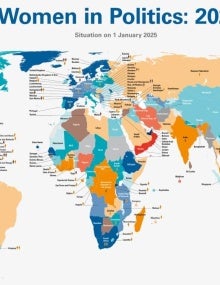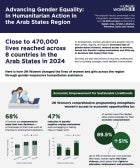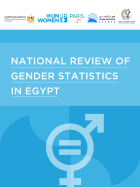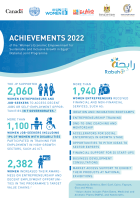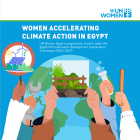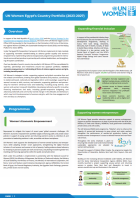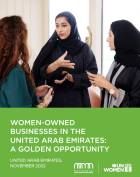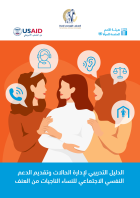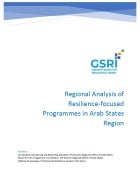1 - 20 of 32 Results
Pagination
Date:
Women and girls in emergencies face heightened risks, such as violence, limited access to services, and lack of decision-making power. Despite these challenges, they are crucial to recovery and building resilient communities.
Date:
As part of the Government of Egypt’s development of the National Strategy for the Development of Statistics, a national review of gender statistics in Egypt was carried out. The report of the National Review of Gender Statistics subsequently examines three key components of gender statistics in Egypt: creating an environment that enables data collection, improving data production, and enhancing accessibility and usage.
Date:
This infographic highlights the main results achieved under the “Women’s Economic Empowerment in Egypt” programme between July 2021 till August 2023. This programme is implemented by UN Women Egypt in partnership with the National Council for Women (NCW), the Ministry of International Cooperation, and the Ministry of Labour and is generously supported by KOICA Egypt.
Date:
This info-graph highlights the main 2022 achievements of the five-year Joint Programme entitled Women’s Economic Empowerment for Sustainable and Inclusive Growth in Egypt – known as “Rabeha”. The Joint programme is implemented by UN Women and UNIDO Egypt in partnership with the National Council for Women (NCW), the Ministry of Trade and Industry (MoTI) and the Micro, Small and Medium Enterprise Development Agency (MSMEDA) with the generous support of Global Affairs Canada (GAC).
Date:
Under the UN Sustainable Development Cooperation Framework (2023-2027), this business case highlights UN Women Egypt Country Office (ECO) on-going contributions and emerging partnerships to accelerate Egypt’s climate action by increasing the access of a diverse range of women to decent employment in agriculture, renewable energy, and science, technology, engineering and math (STEM)- related sectors.
Date:
The UN Women Egypt Country Office’s Country Portfolio Brief gives a comprehensive overview on the main programmes implemented by UN Women during the period from 2023 to 2027 in support of the Arab Republic of Egypt’s Vision 2030 and the National Strategy for the Empowerment of Egyptian Women (NSEEW).
Date:
Women-owned businesses (WOBs) in the Middle East and Northern Africa (MENA) region could make significant contributions to entrepreneurial activity and countries’ economic growth, but face challenges and barriers. This report examines access to finance in the United Arab Emirates for WOBs; describes government and private measures to promote women’s entrepreneurship; looks at global best practices and makes recommendations for policymakers and stakeholders to improve women-owned businesses’ access to financing.
Date:
This training manual aims to build the capacity of service providers on case management and psychosocial support to women and girls’ survivors of violence or exposed to its risk.
Date:
With thanks to the Government of Japan, who generously funded the regional LEAP and COVID-19 programmes as well as the resilience monitoring efforts, UN Women was able to roll-out the gender-sensitive resilience capacity index in 5 countries, namely Egypt, Iraq, Lebanon, Palestine and Yemen, through 11 of its implementing partners.
Date:
The objective of this regional assessment is to look at the implications of the macroeconomic response to the COVID-19 pandemic in the Arab region. The regional mapping allows for identification of the dominant trends and policy priorities across different areas of interventions and looks at the potential implications of [largely] gender-blind macroeconomic responses and investments during the first six months of the pandemic.
Date:
This desk review summarises global and regional trends and best practices and techniques for reaching out remotely to women and girls who experience violence, including during lockdowns and to survivors of online violence.
Date:
This study and brief aim at providing insights on how gender and other intersecting inequalities impact the risk and vulnerability to HIV for women and girls in Africa.
Date:
Women play an outsized role in the care economy in the Arab States, performing 4.7 times more unpaid care work than men – the highest female– to–male ratio anywhere in the world.
Date:
This report consists of analyzed data and information collected for the banking sector, the public enterprise sector, Egyptian Stock Exchange listed companies, and the Financial Regulatory Authority (FRA) companies. The 2019 “Women on Boards Monitoring Report” analysis reveals that women represent 10% among a total number of 5,707 board members in the included categories. Overall, a total of 578 women are currently serving on Egyptian boards. One-hundred and thirteen qualified women are needed to join boards in the studied categories in Egypt annually, to reach the target of the National Strategy for the Empowerment of Egyptian Women of 30% by 2030.
Date:
In partnership with the National Council for Women in Egypt and UN Women, The Egyptian Center for Public Opinion Research - Baseera, issued an infograph for a survey on Women and COVID-19 Pandemic in Egypt. The poll was conducted on a national representative sample of 1518 females in the age group 18+ during the period from April 4th to April 14th, 2020, with the aim of measuring the effect of COVID-19 on women's lives.
Date:
Based on lessons learned from past outbreaks, this ‘brief’ outlines gender issues related to the COVID-19 pandemic and response in Egypt.
Date:
UN Women Achievements Report gives a comprehensive overview on the main programmes implemented by UN Women Egypt during 2018 in collaboration with its various partners across the four impact areas: Women’s Political Empowerment (WPE), Women’s Economic Empowerment, Ending Violence against Women (EVAW) and Engaging Men and Boys in Gender Equality. It also features the main achievements of the programmes while highlighting the progress made under communications and partnerships.
Date:
The regional programme Men and Women for Gender Equality produced a brief that includes 10 strategies to engage men and boys in partnership with women and girls to achieve gender equality. These strategies were developed and field-tested during the three years of implementation (2015-2018) of the programme in Egypt, Lebanon, Morocco and Palestine.
Date:
Conducted by UNDP, UN Women, UNFPA, and ESCWA, this study on Gender Justice & the Law in the Arab States Region provides a comprehensive assessment of laws and policies affecting gender equality and protection against gender-based violence in Arab countries. The report is composed of 18 country profiles, each of which maps a country’s key legislative developments and gaps regarding gender justice. This introduction provides an overall summary of these country chapters followed by a...
Date:
The ‘Year of Egyptian Women’ has opened a historical window of opportunity for the advancement of gender equality and women’s empowerment (GEWE) in Egypt. The launch of the National Women’s Empowerment Strategy (2017-2030) has firmed the political commitment towards realizing women’s political, economic and social rights as granted by the Constitution. The ambitious goals and targets do not only place women’s empowerment as a prerequisite for achieving gender...
